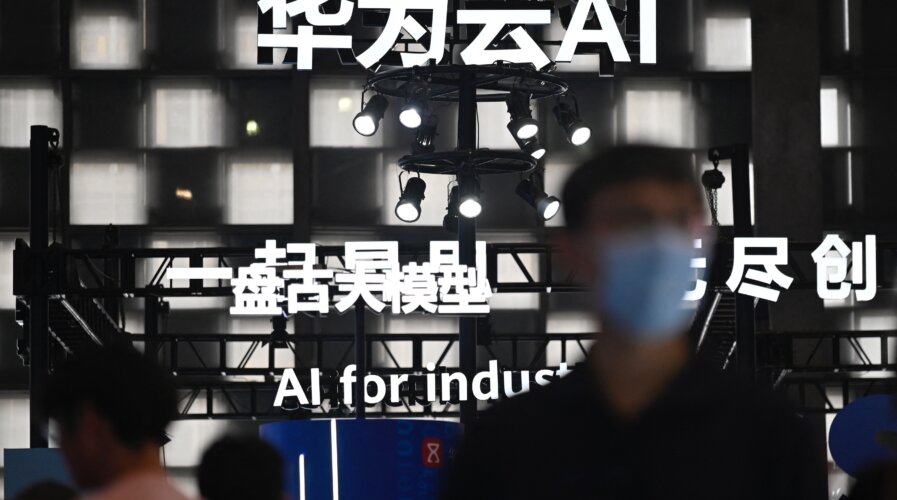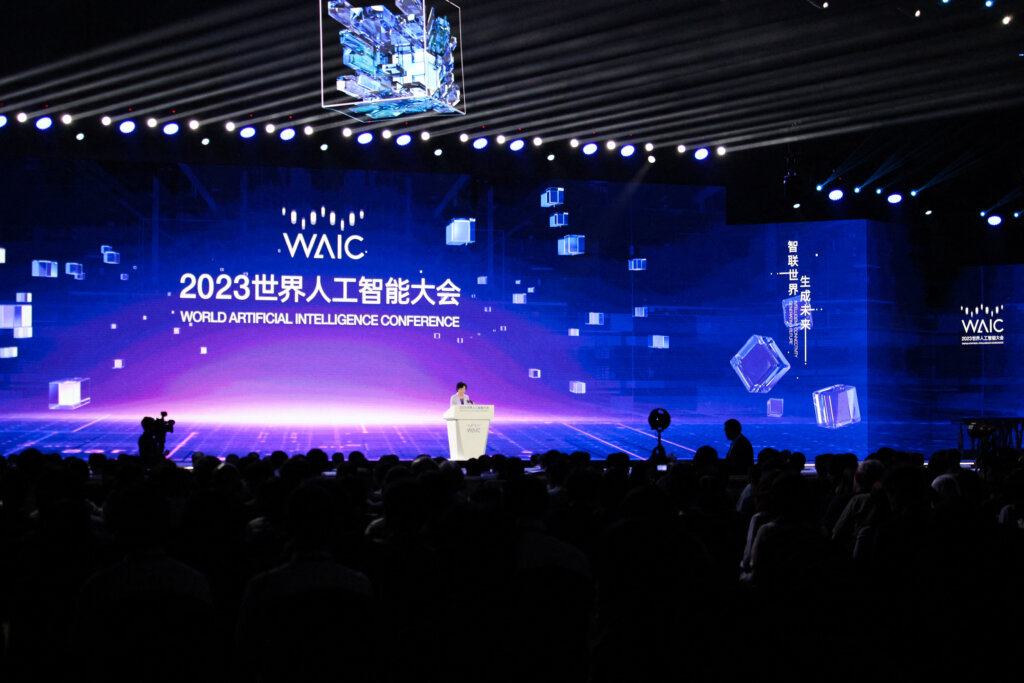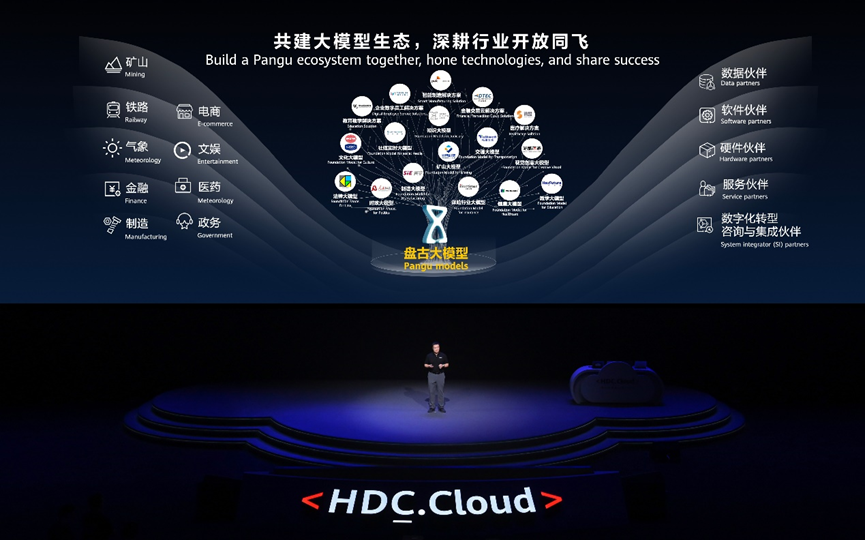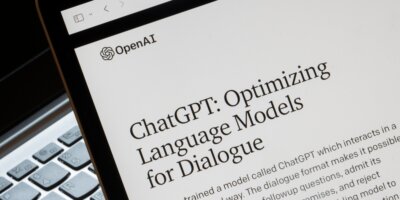
Photo: People visit the AI produce during World Artificial Intelligence Conference (WAIC) in Shanghai on July 7, 2023. (Photo by WANG Zhao / AFP)
How China is staying ahead of the AI race amidst a global ChatGPT rush
- Local authorities have extolled the potential of AI to help drive economic growth and become a useful daily tool in China.
- Chinese Big Tech firms have rolled out their respective LLM applications for broader adoption in various businesses.
From August 15 onwards, China will implement the world’s first rules governing generative artificial intelligence (AI) in two weeks. The finalized regulations are more relaxed than the initial draft in April this year, suggesting that the Chinese authorities have softened their stance on the burgeoning industry.
The move by China is the first, and most major in the world, toward regulating the nascent generative AI sector. When the Cyberspace Administration of China (CAC), the nation’s top internet watchdog, released the latest version of its guidelines, they also acknowledged the need to compete for global leadership in the AI field.
So far, China’s top internet companies—including Alibaba, Baidu, and JD—have already announced their AI bots to rival OpenAI’s ChatGPT. It all started with Baidu, the Beijing-based search provider that debuted Ernie Bot in March as China’s first significant riposte to ChatGPT.
That eventually sparked a race by domestic tech firms, including Alibaba Group Holding Ltd and Tencent Holdings Ltd, to unveil rival platforms. Even AI specialist SenseTime, and telecommunications equipment maker Huawei Technologies, unveiled their generative AI services to keep up with the boom.
Overall, the capital of China, which hosts more than one-third of the country’s “core AI companies,” accounted for 40 out of around 80 large language models (LLMs) that have already been launched, according to Jiang Guangzhi, director at Beijing’s Bureau of Economy and Information Technology.
An LLM is a deep learning algorithm that can recognize, summarize, translate, predict, and generate text and other forms of content based on knowledge gained from massive datasets. In short, Beijing is now home to half of all China-developed AI models.
China also announced during the World Artificial Intelligence Conference (WAIC) in Shanghai earlier this month that a new government body was responsible for implementing a national LLM standard. The China Electronic Standardization Institute, under the Ministry of Industry and Information Technology (MIIT), said it had enlisted Baidu, Huawei, cybersecurity firm 360 Security Technology, and Alibaba to lead a special task force that will draw up the new LLM standard.

Guests attend the opening ceremony of the World Artificial Intelligence Conference (WAIC) in Shanghai on July 6, 2023. (Photo by REBECCA BAILEY / AFP)
The standardization initiative reflects how local authorities have extolled AI’s potential to help drive economic growth and become a useful daily tool while maintaining caution about its risks and asserting technology regulation. Still, internet regulator the CAC has yet to issue a license for any generative AI product in the country.
Recently, Tech Wire Asia reported on Chinese Big Tech’s answers to ChatGPT. This article will look into the LLM applications or generative AI models for broader adoption in various businesses and government services.
Tencent’s 50 LLM-enabled solutions for a dozen of industries
Last month, the Chinese social media and gaming giant launched its industry-oriented LLM service aimed at various traditional sectors, from finance to media. According to a post published to its official WeChat account, the Shenzhen-based company’s cloud arm launched its LLM as a model-as-a-service [MaaS] solution.
Together with clients, the company has launched over 50 LLM-enabled industrial solutions covering over ten industries, Tang Daosheng said at the event, a senior executive vice-president at Tencent and chief executive of its cloud and smart industries group.
Tencent Cloud’s LLM solutions will precisely cater to industries ranging from finance, media, and travel to education, with clients including China’s state media, China Media Group, the Shanghai University, and Fujian Big Data Group, among others, according to the WeChat post.
Tencent is also working on a foundational AI model dubbed Hunyuan, which is yet to be released. Tencent founder and CEO Pony Ma Huateng said in June that his company was in no rush to launch unfinished products.
Huawei’s Pangu Models 3.0

Kang Ning, President of Huawei Cloud Global Ecosystem, introducing Pangu ecosystem programs. Source: Huawei
Huawei Cloud Pangu models were designed to focus on the practical needs of specific industry scenarios. Regarding government services, the Shenzhen Futian district government worked with Huawei Cloud to develop the intelligent government service assistant Xiaofu, which the Pangu Government Model powers.
The Pangu Government Model has been trained on over 200,000 government data records, covering government policy documents, government encyclopedia knowledge bases, government hotline data, and other common knowledge, so it has extensive knowledge of government policies, regulations, and government service processes,” Huawei said in its blog posting.
Then there is the Pangu Mining Model, which Huawei said has been used at eight coal mines in China. On railways, the Pangu Railway Model can accurately identify 67 types of freight cars, and over 430 types of faults found on railways and freight cars.
It can quickly scan millions of images captured by the railway TFDS system and filter out 95% of the fault-free images. There is also the Pangu Meteorology Model (or Pangu-Weather), the first AI model to have surpassed state-of-the-art numerical weather prediction (NWP) methods in terms of accuracy.
“The prediction speed is also several orders of magnitude faster. In the past, predicting the trajectory of a typhoon over ten days took 4 to 5 hours of simulation on a high-performance cluster of 3,000 servers. Now, the Pangu model can do it in 10 seconds on a single GPU of a single server, and with more accurate results,” Huawei added.
Baidu’s Ernie 3.5
Just three months after the beta release of Ernie Bot, Baidu’s LLM built on ERNIE 3.0, version 3.5, came about. “ERNIE 3.5 has made significant strides in beta testing, surpassing ChatGPT (3.5) in comprehensive ability scores and outperforming GPT-4 in several Chinese language capabilities,” as reported by China Science Daily.
In a blog posting, Baidu said ERNIE 3.5 had achieved broad enhancements in efficacy, functionality, and performance. These improvements are evident in creative writing, Q&A, reasoning, and code generation, as well as in training performance and inference performance, Haifeng Wang, CTO of Baidu, said.
Alibaba’s LLMs
Alibaba’s cloud unit in April unveiled its alternative to ChatGPT – Tongyi Qianwen – which is based on DAMO’s LLMs, marking one of the earliest Chinese companies to join the ChatGPT bandwagon, along with search engine giant Baidu.
According to Alibaba chairman and CEO Daniel Zhang Yong during a conference call with analysts in May, the service had received more than 200,000 beta testing applications from corporate clients. Alibaba then started working with partners to develop industry-specific AI models, Zhang said.
For instance, it plans to launch cloud products and enterprise solutions based on its AI model and integrate AI capabilities into various products, including its workplace collaboration tool DingTalk.
READ MORE
- Data Strategies That Dictate Legacy Overhaul Methods for Established Banks
- Securing Data: A Guide to Navigating Australian Privacy Regulations
- Ethical Threads: Transforming Fashion with Trust and Transparency
- Top 5 Drivers Shaping IT Budgets This Financial Year
- Beyond Connectivity: How Wireless Site Surveys Enhance Tomorrow’s Business Network


